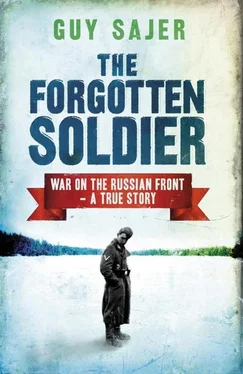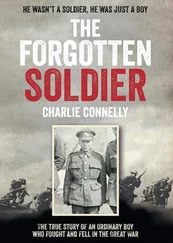Suddenly someone shouted at us. “Hey, you over there!”
A figure was approaching us between the trucks. We could see the silver trim on his cap gleaming through the darkness. Already the feldwebel and the old man were trampling on the fire. The captain came up to us, and we stood at attention.
“What do you think you’re doing? You must have lost your minds! Don’t you know the orders? Since you’ve come out to watch round the campfire, you can pick up your guns and make a nice patrol of the neighborhood. Your festivities have undoubtedly attracted a few guests.
Now it’s up to you to find them. By twos until we leave. Understood?” It was the last straw. With death in my soul, I went off to look for my damned gun. I was on the point of collapse from hunger, exhaustion, cold, and God knows what else. I would certainly never have the strength to spend the night slogging through that horrible snow, whose frozen crust covered more than two feet of white power, into which I sank over the tops of my boots. I was filled with rage which I couldn’t express. Exhaustion prevented reaction. I returned to my companions in misfortune as best I could. The feldwebel decided that the fellow who was pushing fifty and myself should take the first patrol.
“We’ll relieve you in two hours, which will be easier for you.”
I have never understood why, but I had the distinct impression that the miserable cur had purposely put me with the old man. No doubt he preferred the other fellow as a companion — twenty-five years old and strongly built — to a scrawny seventeen or an old man. I started off with my fellow sufferer, convinced that we were a vulnerable combination. After the first few steps I tripped, and fell down full length onto the snow, scraping my hands against the hard, icy crust. As I was pulling myself up, I was scarcely able to contain a paroxysm of tears.
The old man was a decent sort: he too seemed to have had about enough.
“Did you hurt yourself?” he asked in a paternal tone.
“Merde,” I replied.
He said nothing. Pulling his collar a little higher against his head, he let me get in front of him. I didn’t really know where we were supposed to be going, but that was unimportant. What I knew beyond a doubt was that I would double back as soon as the black mass of the convoy was out of sight, and despite my exhaustion I managed to put a considerable distance between myself and the old man. I moved forward nervously, breathing as little as possible, as the icy air burned my nose. But after a moment I couldn’t go on. My knees trembled, and I dissolved in tears. I could no longer grasp anything that was happening to me. I could see clearly in my mind’s eye France, and my family, and the games I used to play with my friends and my Meccano set. What was I doing here? I can remember crying out between bursts of sobs: “I’m too young to be a soldier.”
I don’t know whether or not my companion was surprised by my confusion. When he caught up with me he contented himself with saying:
“You walk too quickly, young fellow. You must forgive me if I can’t keep up with you. I shouldn’t even be a soldier. I was retired before the war. But six months ago they called me up anyway. They need everyone they can get, you know. Anyway, let’s hope we get home again safely.”
As I didn’t understand very much about the times, and needed someone to blame, I began to attack the Russians: “And all of this on account of those bastards! The first one I meet has had it!”
However, I wasn’t able to forget the events of the afternoon. The partisan and his execution had overwhelmed me. The poor old man looked at me in bewilderment. He must have wondered whether he was involved with a party fanatic or a security agent.
“Yes,” he said in a carefully veiled tone. “They’re certainly making us sweat. It would be better to let them settle it among themselves. They won’t stay Bolshevik for long. And in the end, anyway, it’s none of our business.”
“And Stalingrad! We certainly have to supply the Sixth Army! My uncle is there! They must be having a tough time.”
“Of course they’re having a tough time. We don’t know everything. Finishing off Zhukov isn’t going to be easy.”
“Zhukov will quit, the way he did at Kharkov and Zhitomir. This won’t be the first time General von Paulus made him run.”
He said nothing. As we lived without much information from the advanced front, the conversation came to a halt. I certainly never guessed that the doom of Stalingrad was already sealed; that the soldiers of the Sixth Army had given up hope and were fighting in horrible conditions, with heroic tenacity.
The sky was covered with stars. In the moonlight I was able to see the little student’s watch strapped on my wrist, a souvenir of my certificat d’etudes in France. Time seemed to be standing still, and those two hours dragged like centuries. We walked slowly, watching the tips of our boots sink into the snow with every step. There was no wind, but the cold, which was growing increasingly severe, pierced us through and through.
For two hours at a time, throughout that accursed night, we shivered in this way. Between each tour of duty, I was able to snatch a brief sleep. The first glimmers of light, which found me shoveling snow, fell on a face creased with exhaustion.
With dawn, the cold grew even more intense. The woolen gloves we had been issued were worn through, and our frostbitten hands were wrapped in rags, or in our extra pairs of socks. But in spite of the exercise of shoveling the cold was no longer bearable. We slapped our hands against our sides and stamped our feet to keep our chilled blood moving. The captain, in a moment of compassion, ordered some ersatz coffee prepared and served to us boiling hot. This was doubly welcome because for breakfast that morning we had been given nothing but a portion each of frozen white cheese. The corporal at the canteen told us that the thermometer outside his truck read twenty-four degrees below zero.
I don’t remember exactly how much longer this journey took. The days which followed have remained in my memory like a frozen nightmare. The temperature varied between fifteen and twenty-five below zero. There was a horrifying day of wind when, despite all of the orders and threats from our officers, we abandoned our shovels and took shelter behind the trucks. On that day the temperature fell to thirty-five degrees below zero, and I thought I would surely die. Nothing could warm us. We urinated into our numbed hands to warm them, and, hopefully, to cauterize the gaping cracks in our fingers.
Four of our men, who were seriously ill, suffering from pulmonary and bronchial pneumonia, lay groaning in makeshift beds set up in one of the trucks. There were only two medical orderlies for our company, and there wasn’t much they could do. In addition to these serious illnesses, there were at least forty cases of frostbite. Some men had patches of skin on the ends of their noses which had been frozen and had become infected. Similar infection was common in the folds of the eyelids, around the ears, and particularly on the hands. I myself was not seriously affected, but each movement of my fingers opened and closed deep crevices, which oozed blood. At moments the pain was so intense that I felt sick at my stomach. At moments my despair was so intense that I broke down in tears, but as everyone was preoccupied with his own troubles, no one paid much attention.
Twice, I went to the canteen truck, which doubled as the infirmary, to have my hands washed in 90-degree alcohol. This produced paroxysms of pain which made me cry aloud, but afterward my hands felt warm for a few minutes.
Our inadequate diet contributed to our desperation. From Minsk, our point of departure, to Kiev, the first stop, was a distance of about 250 miles. With all the difficulties of the route taken into consideration, the authorities had given us food for five days. In fact, we required eight days, which obliged us to consume some of the rations intended for the front. In addition, we had to abandon three of the thirty-eight vehicles in our group because of mechanical failure, destroying them along with their cargoes, so that they wouldn’t fall into the hands of the partisans. Of the four men who were seriously ill, two had died. Many others suffered from frostbite, and a few had to have frozen hands or feet amputated.
Читать дальше












